- Home
- Deepak Chopra
Reinventing the Body, Resurrecting the Soul Page 18
Reinventing the Body, Resurrecting the Soul Read online
Page 18
Criticism and perfectionism constitute another variation on attacking before someone else attacks you. In this case, the critic fears being seen as imperfect. There’s an underlying sense of being wrong or defective. The sense of being never good enough is projected outward: “Nothing can be right with you if I’m not right.” When our ego adopts this agenda, it thinks it’s protecting us from anxiety and humiliation. Perfectionists hold up impossible standards so that nothing can ever be good enough, thereby proving that they are right to feel that they can never be good enough. There’s obviously an element of anger here as well, since the critic and perfectionist are attacking their victims, much as they always protest that “it isn’t personal.” It’s always personal—to them.
Dependency is the ego’s way of pretending to be helpless because it doesn’t want to face its fear. Dependent people cling and act needy. They refuse to take responsibility. They idealize stronger people and try to latch on to them (if only in fantasy, as hero worship). The underlying physical cues are those of anxiety, depression, humiliation. When they are happy, dependent people warm up; they love being loved. When they have no one to lean on, however, they become cold, withdrawn, and depressed. There’s often a sense of vagueness about them, because they don’t know how to get what they want. They depend on someone else to get it for them, as children do. The body will often show signs of being childlike and immature by being weak, clumsy, uncoordinated, and prone to injury and sickness.
Competitiveness, overachieving, and acting overbearing is a very general ego strategy, one that externalizes fulfillment and makes it dependent on winning. The underlying feeling can be hard to read. It could be anger or fear. It could be anything, really, since the person is so fixated on outer accomplishment that there are no windows looking inward. The physical cues are also hard to read, because competitive people exert constant efforts to be energized, up and running. They are easy to read when they fail, however, since this leads to anger, frustration, and depression. Instead of examining those feelings, the born winner waits them out until he has recharged his batteries and is up again. But no matter how exuberant and energized they appear, overly competitive people secretly know the price they are paying for being number one. Climbing to the top excites them, but they feel exhausted and insecure once they get there, anxious about what tomorrow will bring—which is inevitably newer, younger competitors just like them. In time, winners can wind up baffled and confused. They have built so many inner barriers to protect their “weak” feelings—as they would label them—that when they decide to look inward at last, they have little idea how to go about it.
Failure, underachieving, and checking out is the opposite strategy from being a winner. The ego, never competing or fully engaging, prefers to sit on the sidelines. It lets life pass by while hanging out. The physical cues are generally not hard to spot. Because they are listless, such people show signs of anxiety, a chronic hidden fear that makes them cold, sluggish, limp, undefended, and vulnerable. Their bodies look slumped as if in defeat. The chest is sunken, the posture stooped. Their eyes are averted or look at the ground. There’s a general sense that they don’t want to be seen or noticed, so their bodies often appear to shrink. It may be that the person is actually holding a job and supporting a family, but inside, their sense of failure is chronic; it makes them feel small, weak, and immature, as if they mysteriously failed to grow up.
To expand in awareness, you must see past these ego agendas and learn to be honest about your motivations. There’s a sort of negotiation constantly going on between your ego and your body. When you become aware of what your body is trying to tell you, then your ego can’t keep reinforcing its agenda. You have physical proof that you are blocking out the flow of experience, which should be easy, carefree, and spontaneous. So when you see yourself falling back on a fixed ego strategy, see it for what it is, and stop. You must catch yourself at the very moment that you begin to act self-important, dependent, or overbearing. Your ego will kick into its prearranged behavior automatically; like muscles, behaviors have memory. Once you trigger them—even slightly—they jump into action.
Simply by being aware, you can check on your body. There will always be signs of an underlying emotion. Feel that emotion; be with it. Contact allows the physical sensation to dissipate naturally; your discomfort lessens as your body lets go of distorted or stuck energy that you have been holding on to. Only in this way can you melt away your defenses. Unless you are aware, change is impossible. But when you bring awareness to your body, you can start becoming undefended. Reality starts to be more acceptable as it is, not as you try to force it to be.
Congratulate yourself for being willing to change. Awareness is capable of overcoming the most restricted boundaries, because every boundary is made of nothing but awareness that has decided to contract instead of expand. Also, appreciate your body for its honesty. It has been letting your soul shine through when your mind refused to. You are making a connection to your body, and each connection, however small, brings you closer to your soul as the level of life where you can reside permanently and with total ease.
Breakthrough #3
Be as Boundless as Your Soul
It takes a major breakthrough to get beyond all boundaries. We are so used to thinking in limited terms that even the soul has become limited. It has become a thing, an object that just happens to be invisible. Look closely at the sentence, “I have a soul.” What does “have” mean in that sentence? It seems to mean the same thing as having a house or having a job. It implies ownership, as if your soul belongs to you. If you did possess a soul that way, the following things could also be true:
You could lose your soul.
You could give it away.
You could put a price on it.
You’d know where your soul is located.
You could compare yours with someone else’s.
These are just a few of the troubling implications that stem from thinking that the soul is an invisible object. You can find someone to believe in every item on the list. Most cultures have legends about losing one’s soul, selling it to the devil, or having demons run away with it. Even today, losing your soul stands as a very real threat to devout Christians. We need to find an alternative idea, because as soon as souls can be lost or saved, blessed or condemned, they become objects. The time has come to make a breakthrough and treat the soul as it really is.
In place of a soul that you own, which is mythical, there’s an unbounded soul that exists everywhere. The soul is primarily a link to the infinite. It consists of pure awareness, the raw stuff from which all your thoughts, sensations, wishes, dreams, and visions are made. Think of white, the purest hue. White doesn’t look to the eye as if all colors could be derived from it. You would suppose the opposite, that no colors could be extracted, since white itself has no color. Pure awareness goes even further. It isn’t a thought, yet all thoughts come from it. It isn’t a sensation, yet the senses derive from it. In fact, pure awareness lies beyond any experience in space and time. It has no beginning or end. Nothing can bind or enclose it, any more than you could enclose all the energy that erupted in the Big Bang. Yet the influence of the soul permeates all of creation. The unbounded soul flows in, around, and through you. Indeed, it is the real you because it’s your source.
I think religions fell back on personalizing the soul as “mine” or “yours” because just as an infinite God boggles the mind, so does the unbounded soul. Something more manageable was needed. Hence a personal God who sits above the clouds and looks down on his children, to whom he has provided a personal soul that fits neatly inside the heart. Reducing the soul to a piece of private property makes it easier to handle, but it distorts reality. Let’s try to reclaim reality. Can you and I be as unbounded as our souls? I think we can. That’s exactly where our journey is taking us. If living inside boundaries creates limitation and suffering, the only alternative is living outside them. There lies freedom from suffering; the
re lies true fulfillment. The unbounded soul can’t be lost or saved, it can’t be denied or evicted by God, because God is made of the same pure awareness.
When you give up the idea of “my soul,” you can participate in an unbounded creation. Countless people don’t realize that such a choice exists; many more wouldn’t choose an unbounded life if it was offered. Living within boundaries offers a sense of security. But this turns out to be an either/or choice. Let me illustrate.
There’s a clever tactic reportedly used by the indigenous Bushmen of South Africa to find water. In the desert regions that the Bushmen have long inhabited—they are thought to be the oldest strain of humanity still existing—water is scarce and difficult to find in the dry season. But one creature that can always locate the most hidden springs and pools is the baboon. The Bushmen trick baboons into showing them where the water is by placing some choice nuts inside a hollow tree. The opening to this cache is barely large enough for the baboon to stick its paw in. When it reaches for the nuts and grabs a handful, the animal can’t get its closed first back out again. The baboon is too greedy to let go of the nuts, and so it is trapped. Hours go by, and eventually the baboon is too thirsty to stay. It lets go of the nuts and immediately runs to find water, with the lurking Bushmen following. The baboon has become their unwitting guide.
There’s a moral here about the soul. As long as the baboon holds on to what it wants, it’s trapped. But as soon as it lets go, it wins its freedom. So long as you cling to anything by saying “mine,” you can’t be free. Your soul isn’t a thing you can cling to and make your own. Caught in the Bushmen’s trap, you can only win your freedom by letting go. The mystery of the unbounded soul is wrapped up in those two issues: how much you want to be free, and how to let go.
How do you let go?
As a practical matter, people are torn between holding on and letting go. In our society, holding on is seen in a positive light: we hold on to our dreams, our hopes, our livelihood, our faith. But there’s a suspicious trace of ego here. The ego holds on too long and for the wrong reasons. It has a vested interest in being right. Is it right to live behind boundaries? You will never know until you challenge your ego’s certainty. That’s why letting go is rarely simple: consider how many miserable relationships persist because one spouse or the other insists on proving that he or she is right Pain and suffering aren’t strong enough to trump the desire to be right. The endless arguments among the world’s faiths, which regularly erupt in crusades, jihads, and other forms of religious violence, attest to this. All religions preach peace, and so warring over peace destroys the very value being defended. Every religion believes that divine love should be followed as a model on earth, but love evaporates in the midst of conflict.
Yet living from the level of the soul is impossible without letting go. This is a choice you make eventually. In daily life, this either/or choice is well defined. Here’s what the two sides look like.
SOUL EGO
Accepting Rejecting
Approving Critical
Cooperating Opposing
Detached Clinging
Calm Agitated
Forgiving Resentful
Selfless Selfish
Peaceful Conflicted
Nonjudgmental Judgmental
Your soul is just as much a part of you as your ego. Given a simple choice, all of us would choose the soul’s way. We would rather accept than reject; we’d want to be peaceful rather than agitated. But life brings difficulties, and to cope with those difficulties we are forced to make choices that aren’t simple. What if your house was robbed and the police caught a couple of teenagers with the flat-screen television they stole? You have your property back. Would you choose not to prosecute? What if they caught the teenagers, but your television had already been fenced? Would you be more inclined to prosecute? These negotiations between mercy and punishment are symbolic of the fork in the road that presents itself whenever the ego would go one way and the soul the other.
The most common everyday actions move you away from your soul. Today or tomorrow you might
reject an experience in advance
criticize someone else or yourself
oppose a new idea
cling to your point of view
feel agitated inside
resent the position you’ve been put in
raise the level of conflict in the situation
consider your own selfish interests before anything else
cast judgment and blame on others
In each situation the ego is being reinforced. Of course, everyone falls back upon these responses without thinking. Or if they think, they feel justified in choosing the ego. But the fixed, stubborn attitude that results is very damaging. All of us have been maddened by people who take their egos to extremes, who are as predictable as clocks because no matter what you say or do, they never alter in their opposition, stubbornness, and selfishness. Yet the same tendencies are preventing you from letting go, too.
It’s not that your ego has a totally negative agenda. Under normal circumstances it doesn’t. Mainly it acts out of self-protection. Some people—a rare few—have consciously learned how to cope with the world without protecting themselves. They rely on a higher power to protect them, and that’s what you and I must learn to do. Otherwise we’ll never get outside our defenses. We aren’t called upon to be saintly. It’s not about whether you are a good person or not. It just needs to sink in that letting go is the path to everything.
Let’s see why letting go is so difficult. Think back to the last occasion when you rejected somebody because he or she disagreed with you. Or feel inside what it’s like to refuse your cooperation because you have a powerful urge to oppose. Everyday existence brings up these urges in hundreds of small and large ways. Your ego keeps reinforcing the same argument over and over: Look out for number one. Nobody else is going to stand up for you. You can’t afford to sacrifice what you want.
Psychologically, these reactions aren’t about the present but the past. Your ego is urging you to think and act like a damaged child. Such a child only wants what it wants. It has no ability to see beyond the immediate moment, and when it doesn’t get what it wants, a damaged child pouts, balks, and throws tantrums. I know that the phrase “inner child” has been romanticized as an ideal of innocence and love. That child, too, exists in all of us; you will see it anytime that the soul shines through. But your inner child has a shadow self that embodies the tactics of an angry, wounded, selfish infant. When your ego dips into those shadow energies, they impel you to act in very regressive ways.
It’s hard, as a well-adjusted adult, to face the fact that you are harboring a shadow that’s not only destructive but childish and irrational, too. Yet something positive is close at hand once you make it through the shadows. Every spiritual tradition invokes our so-called higher self, the side of human nature that the soul stands for. We recognize ourselves in the love Jesus preached, and in the compassion espoused by Buddha. Every spiritual tradition also makes it clear that our so-called lower nature, identified with sin and ignorance, must be transformed. Unfortunately, the choice is presented in a way that’s unhelpful. How can you adopt love when you are told at the same time that your lower nature is sinful? Condemning the lower self is the opposite of love. How can you adopt peace when you are told at the same time to fight against temptation? You wind up being trapped in your divided nature instead of healing it.
As a practical matter, the part of yourself that you judge against isn’t going to change. It has no motivation to cooperate—quite the opposite, in fact. Whatever you fight against digs in even more deeply. After all, you are threatening its survival. Let me offer an example from politics, since the outer world is easier for most of us to understand than the inner self. In the United States, deep divisiveness developed between people who supported the second war in Iraq and those who opposed it. Eventually the arguments against the war became convincing, if not overwhelming. As an
experiment, a group of pro-war voters were put in a room and asked to rate their support on a scale from 1 to 10. They were then given a talk on the reasons for being against the war. The year was 2008, five years into the Iraqi conflict, so there was a mountain of objective reporting about the most contentious issues, such as weapons of mass destruction, the threat of terrorism, civilian casualties, and so on.
The experimenters presented the antiwar position as factually as possible, being deliberately dispassionate. At the end of the lecture the group was asked to rate their pro-war position a second time on a scale of 1 to 10. The results might startle you, but the group actually became more pro-war. The reason wasn’t that they necessarily disbelieved the antiwar facts. They just didn’t like having their noses rubbed in their mistakes.
Likewise, the parts of yourself that feel judged against will not relent. They will try to persuade you even harder to be selfish, judgmental, and resentful whenever you face outside opposition. Spiritual traditions haven’t taken into account that there’s a process involved in weaning the ego from its self-defeating ways. By putting the issue in terms of morality, sin, and the threat of God’s wrath, Christianity has taken the opposite of an effective approach. Buddhism is less inclined to be moralistic, and it possesses an extremely subtle system of psychology. But when simplified, the practice of Buddhism gets reduced to “ego death,” a direct assault upon the ego as the source of ignorance and illusion.

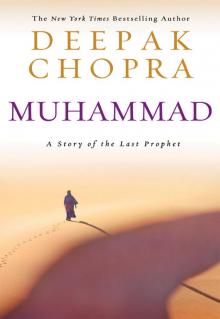 Muhammad: A Story of the Last Prophet
Muhammad: A Story of the Last Prophet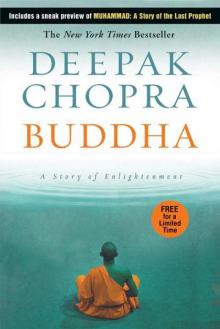 Buddha
Buddha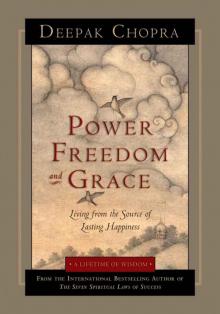 Power, Freedom, and Grace
Power, Freedom, and Grace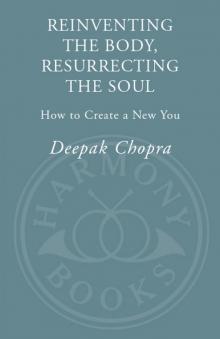 Reinventing the Body, Resurrecting the Soul: How to Create a New You
Reinventing the Body, Resurrecting the Soul: How to Create a New You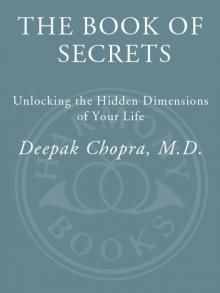 The Book of Secrets: Unlocking the Hidden Dimensions of Your Life
The Book of Secrets: Unlocking the Hidden Dimensions of Your Life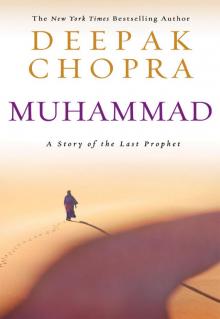 Muhammad
Muhammad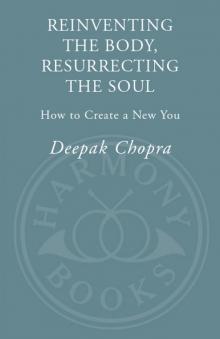 Reinventing the Body, Resurrecting the Soul
Reinventing the Body, Resurrecting the Soul